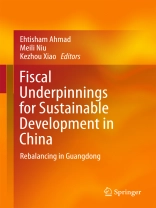This book collects high-quality papers on issues related to the rebalancing strategy in China, new clean cities as “hubs’’, liability management, and involving the private sector, including through PPPs, with specific examples from Guangdong.
Guangdong has been at the forefront of economic reforms in China since the advent of the Responsibility System in the late 1970s, and its successes and challenges reflect those of China as a whole. The need for rebalancing towards a more inclusive and sustainable path is also critical in Guangdong, just as it is in China. Strengthening the fiscal underpinnings and the next stages of tax reforms are critical drivers to accomplishing the requisite structural changes.
Inhoudsopgave
Chapter 1: Evaluation of Public Service Based on Public Risk.- Chapter 2: Approaches towards Sustainable Development in China.- Chapter 3: GFSM Framework, Local Balance Sheets and Managing Liabilities–Examples from Municipality.- Chapter 4: Land Use Reforms: Towards Sustainable Development in China.- Chapter 5: Subnational Debt in China and Germany: a Comparative Perspective.- Chapter 6: PPPs and Managing Risks in China–Some International Contrasts.- Chapter 7: PPP in Transportation Sector: Using Beijing Metro Line 4 as an Example.- Chapter 8: Hub-periphery Development Patterns and Inclusive Growth: Case Study of Guangdong Province.- Chapter 9: Managing Subnational Liability for Sustainable Development: Using Guangdong Province as an Example.- Chapter 10: Debt Management and Taxation at Township Levels in Guangdong.- Chapter 11: Looking at Local fiscal Sustainability through BRT Auditing Evaluation.- Chapter 12: Risk Management of PPP Projects in Guangzhou’s Waste from Catering Industry.












